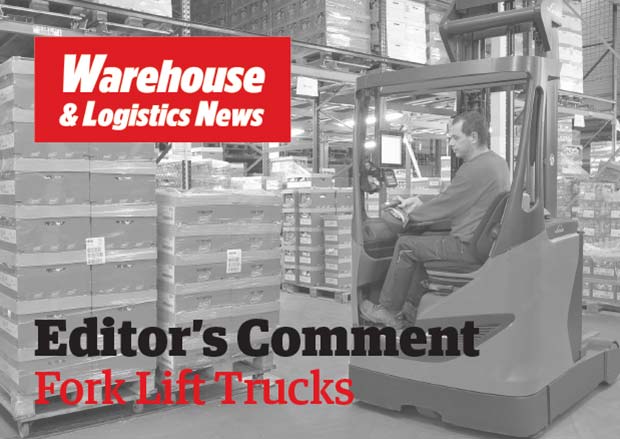The return to the workplace after lockdown gives businesses the opportunity to improve efficiency, reduce costs and save lives. The rules for returning to work may focus on keeping a safe distance to prevent infection but this approach can also prevent accidents, especially to pedestrians working in close proximity to forklifts. “A basic aim should be to separate forklifts and pedestrians entirely,” says Mike Jones of RDD – UK importers for Mitsubishi Forklift Trucks. One suggestion is to create one-way systems, ideally based on existing ‘desire lines’. In areas where forklifts operate, it may be worthwhile banning staff unless they genuinely need to be there. Operators may want to introduce barriers, guard rails or kerbs wherever people and trucks occupy the same space, install safety zone lighting, and impose speed limits.
This article was first published in the August 15th 2020 issue of Warehouse & Logistics News, subscribe to the magazine by clicking here.
 Every lift truck must have a Thorough Examination at least once a year in line with LOLER and PUWER regulations, however equipment could require a more frequent inspection schedule depending on the nature of the site, truck and tasks. According to CFTS, the type of truck and the use of attachments will affect when you book a Thorough Examination. If it has fitted attachments, an inspection must be arranged every 12 months. This changes to 6 months if attachments are not permanently fitted to the truck, or if the truck has an elevated operator position or working platform for lifting personnel.
Every lift truck must have a Thorough Examination at least once a year in line with LOLER and PUWER regulations, however equipment could require a more frequent inspection schedule depending on the nature of the site, truck and tasks. According to CFTS, the type of truck and the use of attachments will affect when you book a Thorough Examination. If it has fitted attachments, an inspection must be arranged every 12 months. This changes to 6 months if attachments are not permanently fitted to the truck, or if the truck has an elevated operator position or working platform for lifting personnel.
Yale’s new ERP25-30VLL Series counterbalance forklift truck is engineered around an integrated lithium-ion battery, enabling space in the operator cabin to be optimised. The Yale ERP25-30VLL Series offers all the benefits of lithium-ion power in a counterbalance truck: its fully-integrated battery requires zero maintenance, while opportunity charging enables the truck to complete a dual-shift operation without having to remove and replace its battery, unlike a conventional lead-acid based solution.
To maintain safety and compliance as operations resume and forklift operators return to work, RTITB is reminding employers of the necessity to provide assessments and refresher training. In March 2020, for those businesses remaining operational, the Health and Safety Executive permitted authorisations to operate for material handling equipment (MHE) operators to be extended by up to three months if it was not possible to deliver refresher training due to Covid-19 (and subject to fulfilment of particular requirements). Although they have not had time away from the workplace, these forklift operators may also now be due refresher training to retain their authorisation to operate.
This year, the Talent in Logistics Award for Forklift Operator of the Year will be determined by a series of virtual competition finals in September, specially adapted to keep people socially distanced and safe. The Forklift Operator of the Year award, delivered in partnership with UniCarriers, will be filmed and made available to watch via You Tube and social media to ensure those across the sector still have the opportunity to support their friends, family and colleagues and be part of the event.
As forklift drivers return to work, it’s a good time to increase safety standards.
George Simpson
Features Editor





Comments are closed.